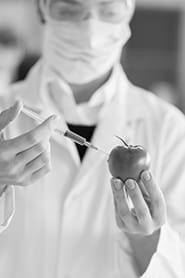Profession food safety specialist

Food science technicians perform (standardised) tests to determine the properties of food or beverage products. They may provide assistance to food scientists and technologists.
Food safety specialist Jobs: Open positions
Find the job of your dreams on Talent.com, one of the largest job sites worldwide.
Job postings: talent.comPersonality Type
Tasks food safety specialist
- Clean, maintain and set up laboratory equipment.
- Collect and prepare samples.
- Conduct standardized tests on food, beverages, additives and preservatives, e.g. to ensure compliance with standards and regulations of colour, texture, nutrients, etc.
- Take measurements and readings, and compute product properties such as moisture or salt content, percentages of ingredients and formulas, e.g. using mathematical and chemical procedures.
- Record and compile test results, and prepare graphs, charts and reports.
- Analyze test results to classify products, or compare results with standard tables.
- Examine chemical and biological samples, using microscope, to identify cell structures, locate bacteria, etc.
- Taste or smell foods or beverages to ensure that flavors meet specifications or to select samples with specific characteristics.
- Mix, blend or cultivate ingredients, e.g. to make reagents or to manufacture food or beverage products.
- Measure, test and weigh bottles, cans and other containers, e.g. in order to ensure hardness, strength and compliance to specifications.
- Order laboratory supplies.
- Develop and adapt laboratory procedures, under the direction of scientists, following technical developments in the area.
Related professions food
- Bakery products machine operator
- Biscuit or cake maker
- Bread baker in manufacturing
- Cereal products machine operator
- Chewing-gum maker
- Chocolate maker
- Chocolate products machine operator
- Cocoa processing machine operator
- Coffee processing machine operator
- Confectionery maker (craft)
- Confectionery maker (manufacturing)
- Edible nut processing machine operator
- Edible oil production machine operator
- First line supervisor food manufacturing workers
- Flour process controller
- Grain- or spice-milling machine operator
- Hand packer
- Margarine processing machine operator
- Packing or labelling machine operator
- Pasta production machine operator
- Pie maker
- Pizza baker
- Quality inspector food (no meat or fish)
- Quality inspector grains, seeds
- Soft-drinks production machine operator
- Sugar production process controller
- Tea processing machine operator
- Vegetable processing machine operator
- Vinegar making machine operator
- Winemaking plant operator
- Yeast maker
Knowledge
- Food preservation
Deterioration factors, controlling factors (temperature, additives, humidity, pH, water activity, etc., including packaging) and food processing methods to preserve food products.
- Food legislation
Legislation related to the food and feed industry including food manufacturing, hygiene, safety, raw materials, additives, GMOs, labelling, environmental and trade regulations.
- Food storage
The proper conditions and methods to store food to keep it from spoiling, taking into account humidity, light, temperature and other environmental factors.
Skills
- Evaluate retail food inspection findings
List, process and evaluate data gathered during retail food inspections undertaken in supermarkets or shops.
- Develop food safety programmes
Develop a food safety programme including traceability, ISO quality systems and HACCP risk management procedures.
- Plan inspections for prevention of sanitation violations
Health inspection of retail shops and supermarkets; identification and prevention of sanitation violations and health risks.
- Maintain personal hygiene standards
Preserve impeccable personal hygiene standards and have a tidy appearance.
- Control food safety regulations
Implement strict control of food safety standards ensuring production, transportation, storage or livestock breeding is according to law and regulations.
- Monitor packaging operations
Observe and supervise the packaging operations undertaken by the workers for compliance to production requirements. Check products for proper packaging such as labelling and date coding in order to ensure appropriate and safe transportation.
- Train employees
Lead and guide employees through a process in which they are taught the necessary skills for the perspective job. Organise activities aimed at introducing the work and systems or improving the performance of individuals and groups in organisational settings.
- Keep task records
Organise and classify records of prepared reports and correspondence related to the performed work and progress records of tasks.
- Take action on food safety violations
Determine when action related to food safety violations may be required; gather and present appropriate evidence; execute protective measures.
- Prepare reports on sanitation
Conduct hygiene inspections in supermarkets and other stores; prepare and make up sanitation reports and analyses.
- Investigate complaints related to consumer protection
Investigate accidents, incidents and complaints; determine if health, safety and consumer protection procedures have been followed.
Optional knowledge and skills
monitor sugar uniformity cold chain food policy food homogenisation use instruments for food measurement ensure correct goods labelling assess food samples audit haccp analyse samples of food and beverages develop food policy general principles of food lawSource: Sisyphus ODB